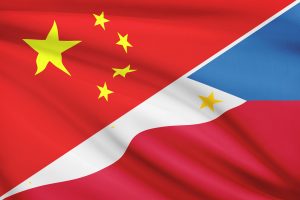The Philippine foreign ministry has once again accused China of intruding into its waters after an incident involving the two countries’ military vessels at a disputed shoal in the South China Sea earlier this week.
In a statement yesterday, the Department of Foreign Affairs responded to an earlier claim by the Chinese military that a Philippine military vessel had “illegally entered” waters near Scarborough Shoal had “no legal basis and only serves to raise tensions” in waters claimed by both nations.
China made the accusation on Monday, and stated that Chinese vessels subsequently followed, monitored, warned, and blocked the Philippine ship, forcing it to exit the immediate vicinity of the shoal.
Senior Col. Tian Junli, a spokesperson for the People’s Liberation Army Southern Theater Command, said that the Philippine ship’s arrival near Scarborough Shoal had “seriously violated China’s sovereignty and international law and basic norms governing international relations, and are prone to misunderstanding and miscalculation.”
In its response yesterday, the Department of Foreign Affairs stated that the shoal, which Manila refers to as Bajo de Masinloc, lies well within the country’s Exclusive Economic Zone (EEZ). “It is China that is intruding into Philippine waters,” the foreign ministry said, according to Reuters. “The Philippines has consistently demanded that Chinese vessels in Bajo de Masinloc leave the area immediately.”
The incident comes after the Philippines last month discovered and subsequently removed a floating barrier that Chinese vessels installed across the entrance to Scarborough Shoal. Manila claimed that the purpose of the barrier was to prevent Filipino fishermen from accessing the shoal’s fish-rich lagoon, “depriving them of their fishing and livelihood activities.”
Scarborough Shoal is a triangular feature lying around 200 kilometers due west of the Philippines’ Luzon Island that fell under China’s control after a 10-week stand-off with the Philippines in 2012. This act prompted the administration of then President Benigno Aquino III to file a lengthy legal complaint with an arbitral tribunal in The Hague, challenging the legality of China’s maritime claims. In 2016, the tribunal ruled mostly in the Philippines’ favor, a ruling that Beijing has refused to recognize.
The increased frictions at Scarborough Shoal have been eclipsed by a rash of confrontations between Philippine and Chinese vessels in contested waters. The most heated have involved Chinese attempts to obstruct Philippine attempts to resupply a small contingent of troops stationed at Second Thomas Shoal in the Spratly Islands, which also lies within the Philippines’ EEZ. The soldiers are housed in the BRP Sierra Madre, a rusting warship that the Philippine Navy grounded on the shoal in 1999, which is degrading quickly.
The Chinese attempts to blockade the ship culminated late last month in an incident in which Chinese vessels collided with two Philippine ships while attempting to block them from resupplying the Sierra Madre. The incident prompted the two sides to trade accusations of wrongdoing, and has pushed bilateral relations to their lowest point since the end of the Aquino administration in 2016.
The renewed South China Sea tensions will be on the agenda when Japanese Prime Minister Kishida Fumio today arrives in Manila for a two-day state visit. According to a statement from the Philippine Presidential Communications Office, the issue will be among several issues that will be discussed in bilateral talks between Kishida and President Ferdinand Marcos Jr.
“Both leaders are expected to discuss the two countries’ multifaceted and dynamic cooperation on political and security cooperation and economic and people-to-people relations,” the presidential office stated, citing a DFA statement.

































